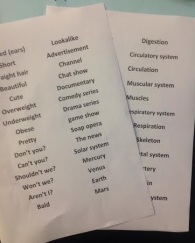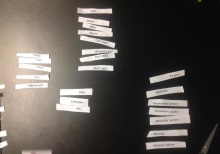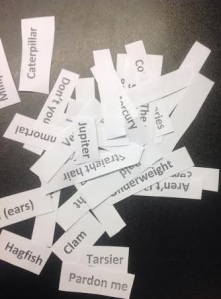 I’ve kept a list of all the vocabulary that has come up in class during the last few weeks of summer school. It’s a fair bit – about 200 words.
I’ve kept a list of all the vocabulary that has come up in class during the last few weeks of summer school. It’s a fair bit – about 200 words.
Here are some ideas for reviewing vocabulary in groups. For these tasks I didn’t use all 200 words, but about 60 or so. To prepare, give students the word list and get them to cut all the words up so each one is on a different slip of paper. Get them to mix all the words up and put them face up on the desk.
1) Do you remember…?
To start off, ask the students to separate the words into two lists – words they remember and words they don’t. The task sounds simple, but it gets a lot of discussion going if they are working in groups, as they will share definitions and remind each other of the meanings.
Next, ask students to organise the words by topic. Don’t restrict them by giving particular topics, let them decide how they want to categorise the words. Afterwards, get students to rotate to another table, have a look at another teams words and see if they have organised them in different ways.
3) Which word type?
Repeat the above, but get students to categorise the words by form (noun, verb, adjective, etc). Again, let them decide the categories. Don’t worry if you’ve just got a load of nouns to revise – you can encourage creativity – ‘words including a consonant cluster’, ‘words from the first half of the alphabet’, etc. Make this competitive by adding points for the most interesting categories and they’re bound to come up with something!
Ask students to group words by their word stress patterns, giving them a few prompts on the board if necessary. They could mark the stress pattern of their categories using Cuisenaire rods.
When I did this the other day, I made the pronunciation stage a little more specific. I just put one different stress pattern on each desk (using the rods), and asked students to find any of their words which match that stress pattern.
Another categorisation task might be to organise the words by number of syllables. Plenty of options I guess.
So that’s the meaning, form and pronunciation of the words reviewed. Time to have some fun now!
5) Including words in a sentence
Students take a word at random and try to include this in a sentence. I find using a dice makes this simple activity more interesting. List numbers 1-6 on the board and give each number a form or structure you have taught (1 = question tags, 2 = passive voice, etc). Students select a word and roll the dice – their sentence must include both elements.
This is far more fun! Have all the words in pile in the middle of the desk. Students take 10 each. The object of the game is to get rid of all your words. You do this by including the word in a conversation. Anyone on the table can talk, there is no set order, but you can’t get rid of more than 2 words in a row. You must try to include the word in a relevant way, not just shout it out. Your group can overrule you if your sentence is completely disconnected.
An example of conversation from my last class
A: I watched a documentary last night on Tarsiers
B: er..so did I. It was very sad because one of the Tarsiers was overweight
C: Another one was like a skeleton, very thin!
Actually, I think I only play this game as the conversations make me laugh. The students really enjoy it as well though!
7) Guess the word
The old ones are the best. One student takes a pile of words. They have one minute to describe as many words as they can to the team, who guess what the words are. They take turns describing the words, and tally up who got the most points at the end of a few rounds.
8) Back to the board
That’s the same as the above really but on a whole class level.
9) Creating a performance
This is my favourite way to re-use some of the vocab, but it might not work for every group. Imagine you have groups of 4  students. Follow these steps
students. Follow these steps
- Students work in pairs
- Set the scene. I display this random picture on the board, and tell the students that this man went missing last night. His wife was extremely worried as he was gone all evening, but he’s just walked through the door. She asks him ‘where have you been????’
- Students then select 8 words from the vocabulary pile at random
- They work together to write/tell the story of what happened to the man, and they must include all the words (allow 5 mins). Each pair will end up with something very random, e.g.
‘The man went out to search for caterpillars to feed to his pet Tarsier. While he was walking down the road, he was hit by a truck. He survived, and realised he was immortal…. etc
- Students then tell their story to the other pair. The group as a whole decide which story is the best
- OPTIONAL: Students select only one story to use, but must edit the story to include two of the words from the other story that they’ve discarded
- Groups work together to produce a silent performance of their story to show the rest of the class.
- Groups watch each performance, and guess the words which had to be included in the story.
- Alternatively, you can just make it a spoken performance, your choice.
10) Typhoon review game
I got this ages ago, again from the Waygook.org forum (uploaded by Sweetpapo). There are plenty of review game templates out there, but this one continues to serve me well. It’s easy to make the questions on each slide, you can prepare a game in about 10 minutes.
Typhoon review game template courtesy of Sweetpapo
11) Spelling board races
I never thought this would be the case, but lately my students have gone mad for spelling races. I put the students in two lines – the two people nearest the board have pens. I say one of the review words, and they must spell this on the board. However, each person can only write one letter, and then they pass the pens on to the next person in the line who adds the next letter, and so on. The first team to spell the word wins.
12) Phonemic script practice
Students choose 10 words at random and practice writing these in phonemic script. Make sure they don’t only choose one syllable words, include some longer words so they can practice marking stress. You can also do phonemic script board races if students are confident using it.
Categories: General, Lesson Ideas, lists, vocabulary




Reblogged this on Meagan Munroe and commented:
This is such a brilliant idea!
LikeLiked by 1 person
All these are absolutely fantastic. All are worth trying. I am sure to try all of them during this academic year. Thank you very much for putting it up. I too have put up some nice ways to practice vocabulary. Please do visit my blogs too.
LikeLiked by 1 person
Thanks for sharing this on British Council website. Some great ideas I’ll be tring out in September.
LikeLiked by 1 person
REALLY THESE 12 IDEAS ARE SIMPLY GREAT.AND OF COURSE IT IS VERY USEFUL TO OUR STUDENTS.IT WILL HELP TO INCREASE VOCABULARY ALSO.
LikeLiked by 1 person
Reblogged this on Language Pathways.
LikeLike
Some good ideas Pete which I will incorporate into future lessons.
LikeLike
I agree wth all above, kee posting – I am waiting or more ideas.Here is my favourite game:
Be faster:
I divide students into 2 or 3 teams. They should choose one person for each try. Then I divide the board into 2 or 3 parts ( each for one team). Then I write numbers and one line above. Numbers stand for words they are going to write and the line for my letter. When the volounteers are ready I write one letter on each line( they should be different) and I do it behind their backs. Then they turn over and start playing normal snake game. The first student gets the point for the whole team.
LikeLiked by 1 person
Reblogged this on Jamie Clayton : thinking, teaching and learning ELT and commented:
A whole bunch of quick ways to recycle vocabulary
LikeLike
Lovely ideas to use in the class. I too use Back to the boards and some other games and my colleague who is a science teacher also uses Back to the boards to review science vocab. Now I have more ideas to use. Thanks for sharing.
LikeLike
Thanks so much! Fab ideas!
LikeLike
fantastic ideas
LikeLike